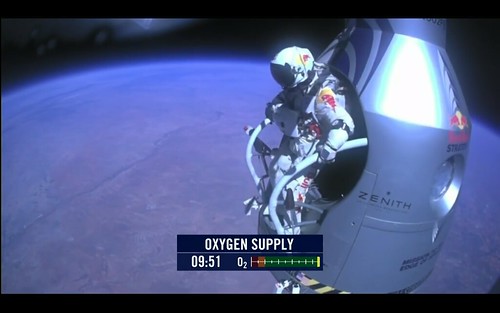 There is only one word I can think of that might describe it: Epic.
There is only one word I can think of that might describe it: Epic.
And that doesn’t do justice to it whatsoever.
The moment in question: Felix Baumgartner’s breaking of the sound barrier in a freefall descent on October 14, 2012.
I spent the vast majority of the live broadcast shaking my head in disbelief. First it was the sheer altitude to which he had ascended – 128,100 feet. Then there was the checklist of items. Then the capsule door was opened. Item 29: release seat belt. Then he stood on the platform – and fell forward – a freefall of 119,846 feet.
Really? Really? Wow. Beyond wow. This was reality TV at its finest, a product of the digital era. Over 8 million people viewed this feat live on YouTube. This may have been our generation’s version of a moon landing, only in reverse.
Felix Baumgartner broke the barriers of human performance – and better yet, pushed the envelope of our thinking in terms of what we believe is possible.
 The fall season is upon us here in Austin. There are fewer hours of sunlight now, so my runs seem to take me into darkness more regularly. Cooler temperatures are slowly, and thankfully, making an appearance. This is always a great time of year in Austin.
The fall season is upon us here in Austin. There are fewer hours of sunlight now, so my runs seem to take me into darkness more regularly. Cooler temperatures are slowly, and thankfully, making an appearance. This is always a great time of year in Austin.
This year, the fall season finds us in the midst of, yes, another presidential campaign. If you can’t find rhubarb in all of these events and activities, then lo and behold, there will always be some to be found in the run up to a November election. With that in mind, I bring you a lively Episode 051.
 The 12th International Conference in Mechanical Diagnosis and Therapy was held October 5 – 7, 2012 in Austin. This conference (along with the Conference Of The Americas) always provides a great opportunity to catch up with many friends, colleagues, and fellow MDT clinicians from around the world. This year was special though – it would be held in Austin. It was the first of many international conferences that I have attended at which I could go home at night and not have to sleep in a hotel bed. Ah yes, it is the simple things in life that we appreciate the most!
The 12th International Conference in Mechanical Diagnosis and Therapy was held October 5 – 7, 2012 in Austin. This conference (along with the Conference Of The Americas) always provides a great opportunity to catch up with many friends, colleagues, and fellow MDT clinicians from around the world. This year was special though – it would be held in Austin. It was the first of many international conferences that I have attended at which I could go home at night and not have to sleep in a hotel bed. Ah yes, it is the simple things in life that we appreciate the most!
Once again, the McKenzie Institute International brought together a great panel of speakers and experts from around the world. One thing that has always impressed me most about this conference is the broad range of speakers, controversial or otherwise. The commonality is that they all attend with a willingness to collaborate and improve the quality of musculoskeletal care, regardless of their expertise or background.
Here are just six of many highlights from the conference.
 Remember the Nike ad that proudly proclaimed that “Bo Knows Football”? Well, after reading Seth Godin’s post yesterday entitled “Denying Facts You Don’t Like”, I would suggest that “Seth Knows Health Care”.
Remember the Nike ad that proudly proclaimed that “Bo Knows Football”? Well, after reading Seth Godin’s post yesterday entitled “Denying Facts You Don’t Like”, I would suggest that “Seth Knows Health Care”.
That may not be his realm, nor specifically the context of the post as such, but he’s got it pegged nonetheless.
Godin noted that “once we start denying facts, it's difficult to know when to stop”. That tends to be the status quo in health care today. Of course, there is a fine line between “denying facts” and straight out-and-out agenda-peddling, but I digress.
With that said, this issue has a tremendous negative impact on a patient’s health care.
 There is a shortage of primary care physicians in the United States. The problem is worsening, and access to care bears tremendous importance to the patient. There are a steady stream of blog posts that are expressing their concern over the problem. If you didn’t know better, you would have to believe that the sky is falling and that universal health care (or some iteration of it) would break the back of the primary care physician population.
There is a shortage of primary care physicians in the United States. The problem is worsening, and access to care bears tremendous importance to the patient. There are a steady stream of blog posts that are expressing their concern over the problem. If you didn’t know better, you would have to believe that the sky is falling and that universal health care (or some iteration of it) would break the back of the primary care physician population.
This has become an annoying issue in health care. At this point, I am really getting tired of hearing this. Frankly, the solution exists as we speak. Yes, the answer exists today. But it is being ignored by those who have a vested interest in the status quo – the gatekeepers themselves.
 There are now 38 days until the US Presidential election. Oh, and 87 shopping days until Christmas. I suspect that most people have a far greater affinity to the latter than the former.
There are now 38 days until the US Presidential election. Oh, and 87 shopping days until Christmas. I suspect that most people have a far greater affinity to the latter than the former.
But with that said, it is critical that we all get out and vote on November 6. The democratic process is only as good as the votes of the constituents. Though there are times when we all feel like we are just a small speck in the political machine, “we the people” are still responsible for putting our representatives into Congress.
This episode of the Rhubarb Report has a few thoughts on the political realm that we will be immersed in over the next 38 days.
 It is a day that stands out in infamy for me. The year was 1994. It is a day that changed my life in any number of ways.
It is a day that stands out in infamy for me. The year was 1994. It is a day that changed my life in any number of ways.
The day in question was day one of a four day course in the McKenzie Method. Yes, I will be the first to admit that it sounds a little corny, all this life-changing stuff. But in hindsight, it really isn’t that far from the truth.
On that particular day, I faced a challenge that all clinicians will face. I sat in a room full of my peers while an instructor, through no fault of his own, stood in front of a classroom and challenged every belief I had about my clinical practice patterns and the beliefs I was maintaining about the whole lot.
At the end of the day, it came down to a simple choice.
 "Running Injuries: Etiology And Recovery- Based Treatment" (co-author Bridget Clark, PT) appears in the third edition and fourth editions of "Clinical Orthopaedic Rehabilitation: A Team Approach" by Charles Giangarra, MD and Robert C. Manske, PT.
"Running Injuries: Etiology And Recovery- Based Treatment" (co-author Bridget Clark, PT) appears in the third edition and fourth editions of "Clinical Orthopaedic Rehabilitation: A Team Approach" by Charles Giangarra, MD and Robert C. Manske, PT.
 Allan Besselink, PT, DPT, Ph.D., Dip.MDT has a unique voice in the world of sports, education, and health care. Read more about Allan here.
Allan Besselink, PT, DPT, Ph.D., Dip.MDT has a unique voice in the world of sports, education, and health care. Read more about Allan here.
 Top 5 finalist in three categories: "Best Overall Blog", "Best PT Blog" and "Best Advocacy Blog".
Top 5 finalist in three categories: "Best Overall Blog", "Best PT Blog" and "Best Advocacy Blog".